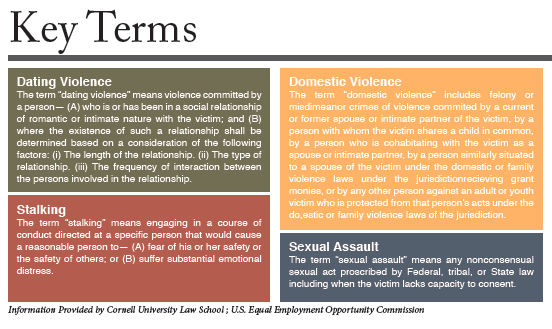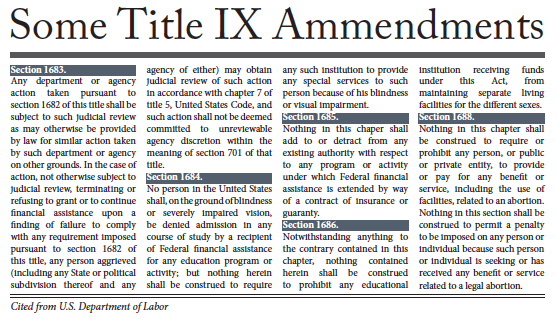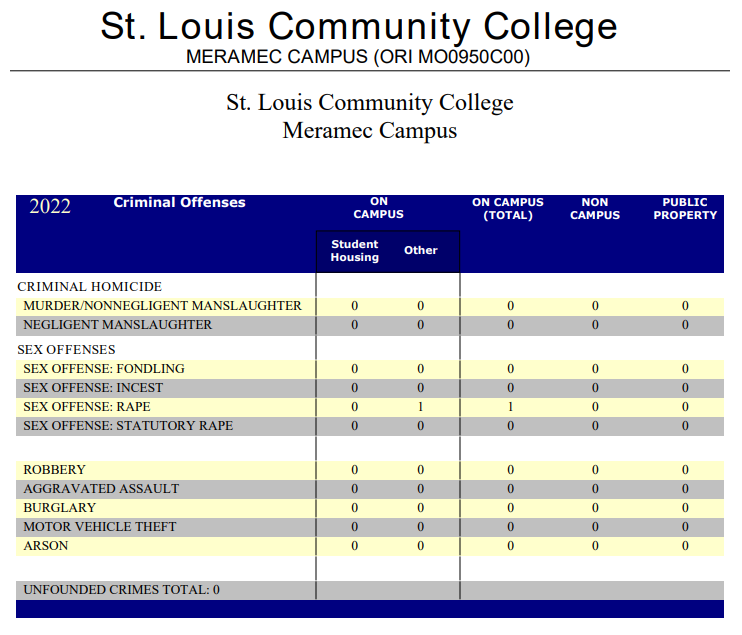For those of you who don’t know what Title IX is, you’re not alone.
There always seem to be a few students who are outspoken about political issues and civil rights. To those who don’t know what issues these students are referring to when they are somehow able to engage in heated discussions with professors, these students seem smarter – more passionate.
This is because these students have taken the time to research something they’re passionate about and develop their viewpoint. In a perfect world, every student would have this kind of time. However, most of us are working full-time while juggling a hectic class schedule.
For those of you who don’t know what Title IX is, you’re not alone. People have been talking about sexual assault on college campuses and LGBT rights extensively for the past year. Title IX, the educational amendment passed in 1972, concerns both of these issues and applies to every educational institution from kindergarten to graduate school.
It concerns sexual assault, because it keeps mostly female – but also male – students from their right to equity in education. It requires educational institutions to fully investigate a claim made by a student and ensure that the student is treated fairly and their ability to learn in these environments is not hindered.
Although it is discussed less than sexual assault on college campuses, there are exemptions in Title IX that legally allow religious educational institutions to discriminate against LGBT students. This is surprising to say the least. The United States has come so far. Gay marriage was legalized in June, which is why it sounds surprising that discrimination is still legal in some situations.
Understanding the basics of Title IX not only provides you with the tools to create a safe learning environment for yourself and others, but helps you question the amendment and potential loopholes. Perhaps you already have an opinion on Title IX, but if not, learning how it protects you and the controversy surrounding it will arm you with the information you need to develop your own factually-supported opinions.
——————————————————————————————————————————————–
Title IX has been a topic of discussion in nearly every university across the United States. Most recently, it has been discussed in regards to sexual assault on college campuses and legal discrimination against LGBT students in academic religious institutions, which are two of the most controversial topics among college students today. However, since Meramec is not a religious institution, the only direct effect religious exemption in Title IX would have on students would be if students considered transferring to a religious institution.
It is estimated that one in five women on college campuses has been sexually assaulted during their time there. This statistic seems shocking – and it is – but it is not as shocking as the number of colleges that were under investigation for Title IX violations. This list of 55 colleges was released in 2014 and sent a message that educational institutions need to comply with Title IX or risk losing federal funding.
This statistic is much lower on community college campuses, however. Meramec, for example, showed no reported incidents of sexual misconduct in their 2014 Safety Report. Florissant Valley had eight reports of stalking in 2013, but overall STLCC as a whole has relatively low reports of sexual misconduct.
In October 2014 however, Bill Woodward was hired as the associate vice chancellor of student affairs at STLCC. He ensures that STLCC not only complies with Title IX, but handles investigations appropriately. During his time at STLCC, Woodward has begun to create a Title IX Task Force which will involve students in spreading awareness of Title IX and educating students on how to best address sexual misconduct.
STLCC faculty began meeting in February 2015 and are discussing the best way to educate students about Title IX.
“We’re trying to sort of get ahead of the game and address these issues…I think that there’s been more of this push towards looking at this particular problem that we’re starting to see, or maybe that we have always seen but now we’re trying to sort of address it,” said Amanda White, associate professor of sociology at Meramec and part of the Title IX Task Force. “There’s been a lot of conversation about sexual assault on campuses and so I think the push has been, because these are educational institutions receiving federal funding, they have sort of broadened the scope of looking at what are some of the experiences women are having on college campuses,” White said.
Some of the information that the Task Force wants to relate to students includes what to do in the case that you are a victim of sexual misconduct. For instance, a police report is not required to receive medical assistance. However, in case you want to file a report at a later date, a sexual assault exam helps collect evidence. Once a claim of sexual misconduct has been made to any campus staff member, with the exception of a select list of counselors, they are required by federal law to investigate the charges. “We have a counseling department that can deal with dating violence issues, domestic violence issues, sort of the personal side of those issues. But then let’s say that a student is in a violent relationship that he or she wants to leave. We also have resources connected to the community. Resources that help students, including living arrangements,” White said.
Currently, Woodward is recruiting students to join this task force. Efforts to involve students have included posters around campus and a booth at the Student Involvement Fair. Students are encouraged to participate by contributing graphic work to posters, helping film educational videos, giving class presentations and handing out flyers. “The purpose is for us to have students be involved on campus in education and awareness around sexual misconduct… to bring educational awareness to the community and also on campus. The purpose is for these students to be on the frontlines and giving information…basically being the voice and spreading the word,” said Claire Martin, student assistance program manager.
Martin ran the Title IX Task Force booth at the Student Involvement Fair where 18 students signed up to join. Students will also be able to participate in meetings where policies regarding sexual misconduct are written. Arguably the most important part of the Title IX Task Force is educating students on what behaviors violate the amendment.
Being able to recognize behaviors which create a hostile learning environment is the first step in maintaining a productive educational environment. When it comes to Title IX, students have more power than they realize. The amendment states, “No person in the United States shall, on the basis of sex, be excluded from participation in, be denied the benefits of, or be subjected to discrimination under any education program or activity receiving Federal financial assistance.” This means that if an educational institution is in violation of Title IX, they are at risk of losing federal funding. This has created equity in sports, admission, recruitment, educational programs and activities, course offerings and access, counseling, financial aid, employment assistance, facilities and housing and scholarships in educational institutions from kindergarten to graduate school. There are exceptions to Title IX, however.
Arguably the most controversial exception is that religious institutions whose tenets contradict Title IX are exempt. For instance a student was expelled from California Baptist University because it was discovered that they were transgender. The university was legally allowed to do this because their religious beliefs contradicted Title IX. Spring Arbor University is another example. The university prohibits students and employees from having premarital sex, abortions and participating in homosexual activities. Students may also be punished for dating someone of the same gender. This is all completely legal under Title IX and has caused some to call for stricter regulations.
To be fair, why would a student choose to attend an institution that discriminates against them? The problem is, universities that don’t condone LGBT students or pregnant women don’t advertise this. In fact, even looking through student handbooks and codes of conduct, it is extremely difficult to find. For instance, Spring Arbor didn’t mention these issues at all while California Baptist University only hinted at them. CBU’s handbook stated, “In compliance with both state and federal law, California Baptist University does not illegally discriminate on the basis of any protected category, except to the extent it is necessary to fulfill its religious purposes…”
Unless they were to really examine that statement, it isn’t likely that a student would understand they weren’t protected against discrimination. These two issues – sexual assault on campuses and exemption from Title IX due to religious beliefs – are why everyone is talking about Title IX and why you should be too.














